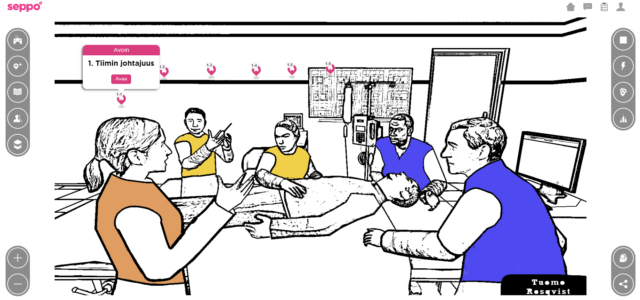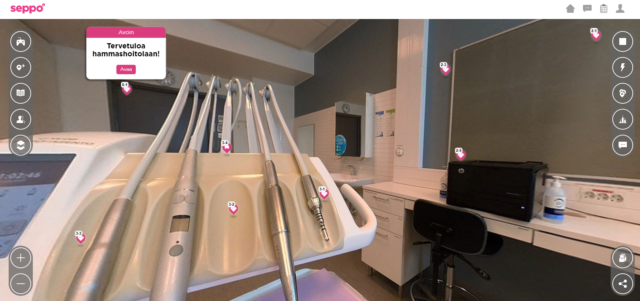The Versatile Use Of Seppo Games In A Hospital Environment
Training Expert
The Versatile Use Of Seppo Games In A Hospital Environment
In matters of training and competence development in The wellbeing services county of Central Finland, the Competence and Development Services support all staff. The Competence and Development Services are responsible for planning and implementing statutory and work-related training and continuing education in cooperation with the areas of responsibility and service areas. The services use a variety of methods to develop and ensure competence. Game-based learning is an excellent example of this.
Seppo has already been used in The wellbeing services county of Central Finland competence and development services for three years for various purposes and more applications are being piloted. Training expert Eerika Rosqvist explains how the idea of using Seppo originally came about and how it has expanded over time.
Games for preparing a drug infusion and as part of an initial lecture on multidisciplinary team simulations in healthcare
Eerika got to know Seppo herself for the first time at the Future Technologies Training 2019 – 2020 of the Vocational College of North Central Finland (POKE) and got excited about the platform. The need to use the platform arose soon after from the nursing students in the intensive care unit. The first Seppo game was built around teaching nursing staff how to prepare a drug infusion. The game provided an interactive and engaging way to learn how to prepare a drug infusion through images and instructional videos, including a detailed explanation of the equipment and processes needed to prepare the infusion. In particular, the game supported the reinforcement and validation of skills and could be played by staff members on their own, regardless of time and place.

After the first Seppo game, the use was extended to multi-professional training sessions for doctors and nurses, as well as training sessions specifically for nursing staff. Eerika explains the versatile use of Seppo:
“Some of the games are short games designed to test your level of competence, while others are more extensive games designed to familiarise you with the subject and to reinforce and confirm your skills.”
Seppo has also been successfully tested as a substitute for the initial lecture part in multi-professional training of doctors and nurses on non-technical skills needed to treat trauma patients. The number of participants was close to 200.
“The simulation training started in the classroom and instead of the traditional theory lecture that starts immediately, the participants were given tablets. There was no need to go over the same topic again, the lecture allowed them to move directly on to the next topic.” Eerika says happily.
Even though the participants were from a wide range of age groups, Seppo’s usability was still perceived as good.
Visual and interesting entities
One of the Seppo games is about identifying a pressure ulcer. Pressure ulcer recognition, i.e. the ability of a nurse to identify a bedridden patient’s potential pressure ulcer at an early stage, is important,” says Eerika. The topic was turned into a Seppo game using visual elements, such as the different stages and warning signs of a pressure ulcer. The Identify Pressure Ulcer game has therefore been integrated into the wider Pressure Ulcer Prevention Mode online course as additional material, thus enlivening and adding variety to the course materials.
The need for a comprehensive Epidural Pain Management Game, developed by the Acute Pain Service (APS) at Hospital Nova, arose directly from the field. The game guides nursing staff extensively on epidural pain management and is integrated into the Sampo Help Bank, which provides professionals with guidelines for patient care.
“The game code for the Epidural Pain Management Game is in the help bank and it’s a great way to familiarise yourself with the topic in a really comprehensive way.”
As an example of a shorter skill level test game, Eerika mentions a game to test defibrillator using skills. When the hospital moved to a new hospital, the defibrillators were rebranded and the staff were trained to use the new machines. In addition to completing the official equipment “driving licence”, skills were tested with the Seppo game and the game is embedded in the orientation material for the emergency department.
Hand hygiene and oral care as a game
Eerika continues that more Seppo games are also currently being piloted. These include a newborn resuscitation game based on the Good Practice Recommendation. In addition, a child resuscitation game based on the Good Practice Recommendation is also in the pipeline. As a new development, work has also started on a hand-hygiene game aimed at all health and social care students and workers.
“Traditionally, hygiene nurses have taught the subject through traditional lectures, but now we can offer a more varied and inspiring approach to this topic,” says Eerika.

And that’s not all: a game on oral health self-care is also being piloted, aimed at primary school children in grades 1-4.
“This will be played in primary schools instructed by oral hygienists. The game visually depicts, among other things, the arrival at the dental clinic, the treatment equipment and the dental clinic as an environment. This will be a good opportunity to experiment with children on how to make exciting and maybe even a little scary things more enjoyable through the game.” Eerika is delighted.
So how has Seppo’s use been perceived in healthcare?
“Seppo has been perceived as useful by health professionals, as it allows staff, and even large numbers of staff, to familiarise themselves and to reinforce and ensure their skills, regardless of time and place – according to individual needs.” Eerika mentions.
Some of the games have been embedded with surveys on the usability of the games, which on a scale of 1 to 5 have scored a low of 3.4 and a high of 4.7. The variety of material and, among other things, the educational videos have been particularly praised.